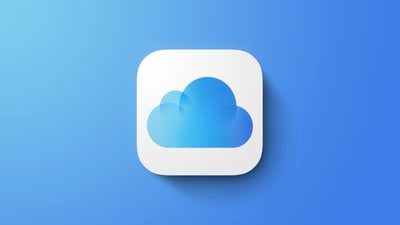Apple Reportedly Storing Over 8 Million Terabytes of iCloud Data on Google Servers
Apple has dramatically increased the amount of iCloud user data it stores on Google Cloud, according to The Information.

The report claims Apple now has over eight million terabytes of data stored on Google's servers. As of mid-May, Apple was reportedly on track to spend around $300 million on Google cloud storage services this year, which would represent an increase of roughly 50% from all of 2020. Apple is said to be the largest corporate client for Google Cloud, dwarfing other high-profile customers like Spotify.
Google Cloud staffers have apparently even given Apple an internal code name that hints at its size as a customer: "Bigfoot."
Apple relies on a combination of its own data centers and third-party cloud storage services, such as Google Cloud and Amazon Web Services, to store iCloud user data like photos and messages. Apple does not provide third-party cloud storage providers with the keys to decrypt user data stored on their servers, ensuring a strong level of security.
The report speculates that Apple's increased use of Google Cloud suggests the company's rising cloud storage requirements have outpaced its ability to develop and operate its own data centers needed to handle the resulting data.
Popular Stories
Apple today introduced its first two physical products of 2026: a second-generation AirTag and the Black Unity Connection Braided Solo Loop for the Apple Watch.
Read our coverage of each announcement to learn more:Apple Unveils New AirTag With Longer Range, Louder Speaker, and More
Apple Introduces New Black Unity Apple Watch BandBoth the new AirTag and the Black Unity Connection Braided...
Apple today confirmed to Reuters that it has acquired Q.ai, an Israeli startup that is working on artificial intelligence technology for audio.
Apple paid close to $2 billion for Q.ai, according to sources cited by the Financial Times. That would make this Apple's second-biggest acquisition ever, after it paid $3 billion for the popular headphone and audio brand Beats in 2014.
Q.ai has...
Alongside iOS 26.2.1, Apple today released an updated version of iOS 12 for devices that are still running that operating system update, eight years after the software was first released.
iOS 12.5.8 is available for the iPhone 5s and the iPhone 6, meaning Apple is continuing to support these devices for 13 and 12 years after launch, respectively. The iPhone 5s came out in September 2013,...
Update: Apple Creator Studio is now available.
Apple Creator Studio launches this Wednesday, January 28. The all-in-one subscription provides access to the Final Cut Pro, Logic Pro, Pixelmator Pro, Motion, Compressor, and MainStage apps, with U.S. pricing set at $12.99 per month or $129 per year.
A subscription to Apple Creator Studio also unlocks "intelligent features" and "premium...
On an earnings call with equity analysts today, Apple CEO Tim Cook responded to fast-rising RAM and SSD storage chip prices in the supply chain.
Cook said that rising memory chip prices had a "minimal impact" on Apple's gross margin in the fourth quarter of the 2025 calendar year, but he does expect a "bit more of an impact" on the company's gross margin in the current quarter.
Cook added ...




















